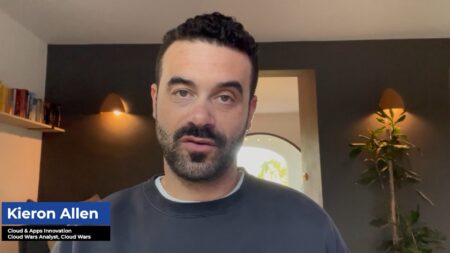
Amid a slew of new-product announcements at Google Cloud Next, I believe the company has a very precise and unconditional timeline for becoming profitable predicated on maintaining its very high rates of growth.
In a Q&A session with analysts following his keynote presentation at Next, Kurian was asked about the level of confidence held by Alphabet’s board in Google Cloud’s ability to turn a profit.
Noting that Google Cloud’s profitability margin when he became CEO almost four years ago was -82% and that today’s figure is “approaching single digits,” Kurian said, “Alphabet’s board has options to invest in lots of things, and based on the results they’ve seen from Google Cloud, they are continuing to invest in our business.”
I’m very confident that would not be happening unless Alphabet’s leadership was fully convinced that the high-scale growth rates will continue and generate the levels of revenue needed for Google Cloud to become profitable.
Consider the steady and singular unique treatment Google Cloud has earned within the sprawling Alphabet portfolio: first, Alphabet began offering some basic financial details about Google Cloud’s performance. Then, a couple of quarters later, Alphabet decided to release significantly more details about Google Cloud’s results. And at the Next event this month, Kurian’s keynote opened with an extended video presentation by Alphabet CEO Sundar Pichai in which he emphasized the deep and broad strategic connections between the parent company’s high-level initiatives and Google Cloud.
It is that high-level synergistic fusion of vision and execution that gives me an extremely high level of confidence that Google Cloud’s profitability is a matter of “when” rather than “if.” And if it’s able to maintain or even stay close to its current growth trajectory, the answer to that “when” question will be: fairly soon, perhaps even by the end of 2023.
“If you look at the cloud business, it’s a relatively high fixed-cost business: You need to build a global network of data centers, a broad set of solutions, and you need significant numbers of salespeople — and those are all fixed costs.
“So, with those high fixed costs in place, how do you make the business profitable? You scale it. And that’s what we’re doing.
“It’s just a matter of time.”
I have heard many anecdotes about how Google Cloud competitors have attempted to sow FUD (fear, uncertainty, and doubt) about Kurian’s company in the marketplace by telling customers that Google Cloud’s ongoing losses might compromise the parent company’s willingness to continue to invest so aggressively.
Well, that’s a lot of nonsense — and I’d suggest that any cloud vendor that’s so desperate that it is resorting to that type of chicanery is doing so because it lacks the ability to compete on more substantive grounds.
Put more succinctly, they’re scared of Google Cloud and where it’s headed.
Take a look at some recent numbers showing Google Cloud’s revenue and profit/loss:
- Q1 2021: revenue of $4.05 billion, loss of $974 million
- Q1 2022: revenue of $5.28 billion, loss of $931 million
- Q2 2022: revenue of $6.28 billion, loss of $858 million
As the revenue is going up, the losses are going in the opposite direction — and doing so quickly.
And anyone who thinks that Alphabet doesn’t have the financial muscle to endure some additional operating losses from a business whose growth rate over the past year is averaging 40 percent is utterly and completely clueless.
Kurian is an extremely savvy CEO, and, during the Q&A session, he handled a range of questions amiably and comfortably. But on the question about whether profitability is coming — and if so, when — he adopted a rather flinty disposition (entirely appropriate, in my opinion) and spoke with unshakeable resolve.
It’s a fascinating balancing act he and Alphabet are playing, and while I didn’t have any doubts before about Google Cloud hitting breakeven, I now, after hearing Kurian’s remarks, am even more certain that Google Cloud will fairly soon become a significant contributor to Alphabet’s profits.
And those goofy comments from competitors will ring even more hollow.








